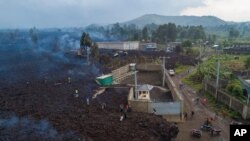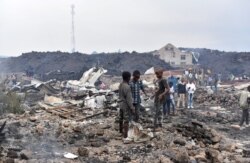Aid agencies are assessing the needs of tens of thousands of people affected by the eruption of the Mount Nyiragongo volcano in the city of Goma in the Democratic Republic of Congo.
Local authorities report 32 people were killed in the eruption, including seven by lava and five others who were asphyxiated by gases.
The U.N. refugee agency reports most of the thousands who fled on foot Saturday as lava flowed down on their towns have returned home.
Their return is fraught with anxiety and uncertainty as the full impact of the eruption is not yet known. However, UNHCR spokesman Boris Cheshirkov said the damage is likely to be extensive.
He said that assessment is based on preliminary findings of an evaluation mission by aid agencies and the DRC government Sunday.
“From the air, the eruption’s path south of the volcano is clear. Two villages on Goma’s northern tip were destroyed and two others were almost completely covered by lava. Our staff heard testimonies from families who lost their homes, and from others who lost children and other loved ones. Entire neighborhoods have been left without electricity and there are fears of water shortages,” said Cheshirkov.
Mount Nyiragongo is one of the world’s most active and dangerous volcanoes. It last erupted in 2002, killing 250 people and making more than 100,000 homeless.
The lava flow from this present eruption stopped Sunday and has been followed by repeated earthquakes, prompting fears of new fissures opening or another eruption.
Cheshirkov said agencies are rushing to help people displaced by this disaster. He said the Red Cross is leading an effort to reunite several hundred children who have been separated from their families. He said the UNHCR and partners are preparing to assist those in need of shelter and other humanitarian relief.
However, he adds the operation is likely to run into difficulty because of blocked access roads.
“The road leading to northern parts of North Kivu province is also damaged by lava, which will hamper the transport of food and goods to the area around Beni, where some 280,000 people displaced by conflict and insecurity since January 2021 rely on humanitarian aid,” said the spokesman.
Cheshirkov said other access routes are cut off by closed borders since the coronavirus pandemic began.
He said another problem hampering the aid effort is the lack of money. He notes the UNHCR has received only 17 percent of the more than $200 million it needs for its operations in DRC this year.





